- Spacious interior and huge boot
- Ridiculously efficient and now more powerful drivetrain
- Rides well and is a keener handler than expected
- It's not cheap anymore
- Missing equipment that rivals have
- Interior doesn't match the price tag
In a sea of of hatches, crossovers and SUVs, Australians overlook the humble sedan, so much so that the once prolific body type is slowly disappearing from Australian car dealerships. Why though? Sedans have been traditionally considered less stylish than other body types, but they don’t come without significant advantages. Especially in the small class, most sedan variants of popular hatches boast bigger boots, bigger rear seats and better visibility. We recently had plenty of time to ponder the advantages of sedans while spending a week being the wheel of the 2023 Toyota Corolla Ascent Sport Hybrid Sedan.
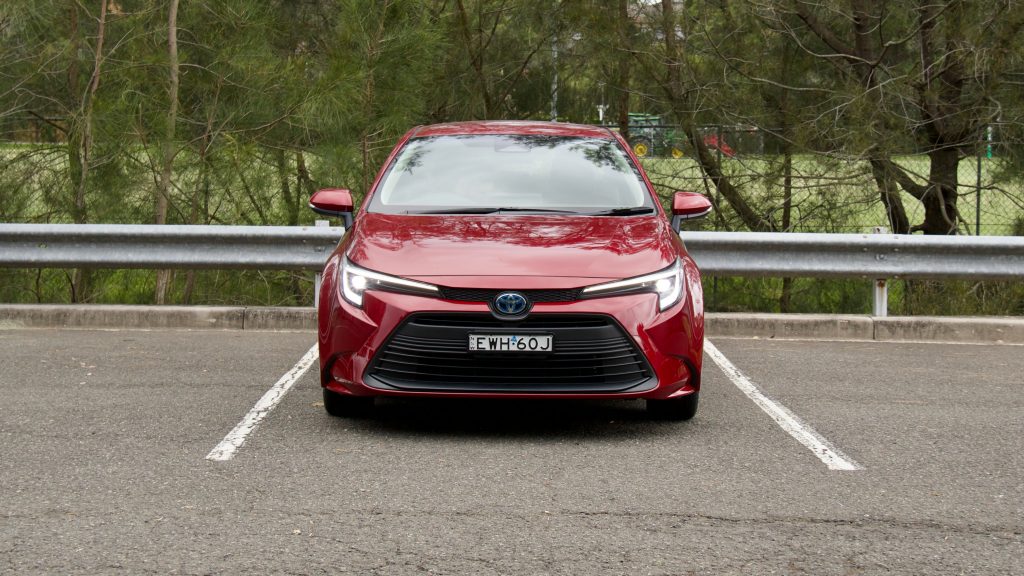
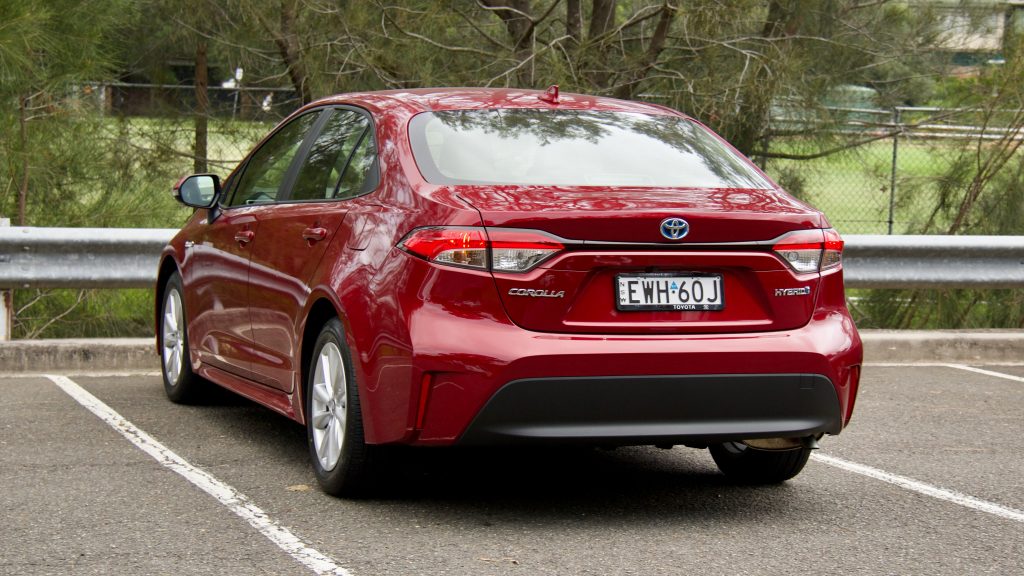
Now in its 56th year of sales in Australia, the Corolla Sedan has been one of the most prolific small sedans in Australia – the sedan was the sole body shape available when the Corolla was originally launched. While today, the hatchback is the volume seller of the Corolla range, there wasn’t even a hatch variant until the 1980s. Toyota gave the Corolla range a mild refresh in late 2022 – has it been enough to keep the Corolla sedan feeling fresh, and is the Sedan the pick of the Corolla range, which now includes a crossover SUV variant, the Corolla Cross? Read on to find out our thoughts after testing the base hybrid Corolla Sedan.
Price & Equipment: 7.5/10
The 2023 Corolla sedan range opens with the Ascent Sport 2.0 litre petrol model which is priced at $28,630 plus on-road costs or about $32,300 drive away depending on location and tops out with the ZR Hybrid model, which costs $39,620 +ORC or about $43,600 drive away. Our test car, the Ascent Sport Hybrid with premium paint, retails for $32,255 +ORC or around $36,000 drive away.
Standard equipment includes 16-inch alloy wheels, dusk-sensing auto LED headlights with LED daytime running lights and front indicators, a rear LED fog light, automatic wipers, heated mirrors, an auto-dimming rear view mirror, a 7.0-inch semi-digital instrument cluster, keyless entry and start, four auto up/down windows, single-zone climate control, two USB charging points, an 8.0-inch touchscreen infotainment screen with satellite navigation, digital radio, wireless Apple CarPlay and wired Android Auto, a six speaker audio system and a one year subscription to Toyota Connected Services which includes remote connectively and driving insights through a smartphone app.
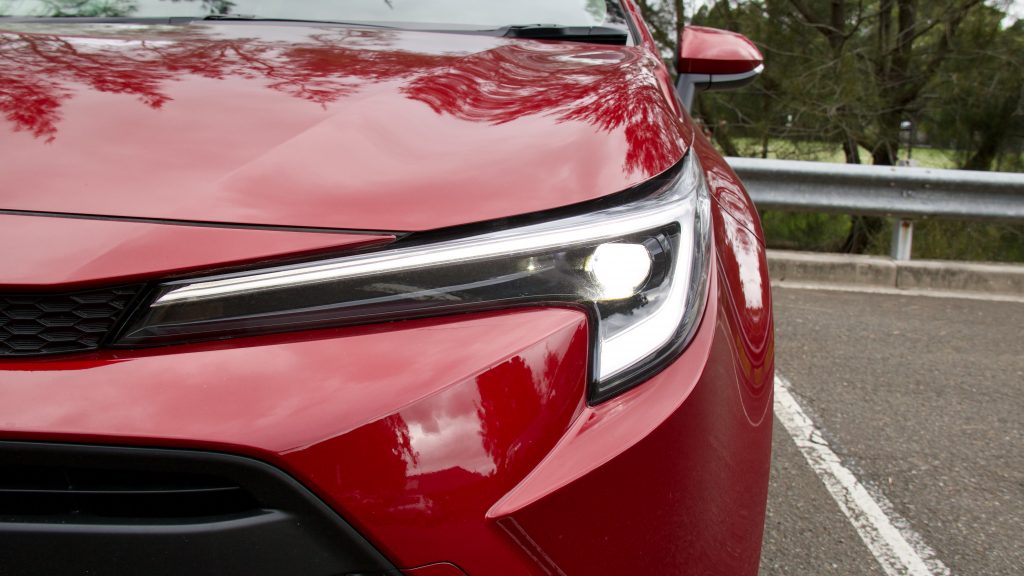
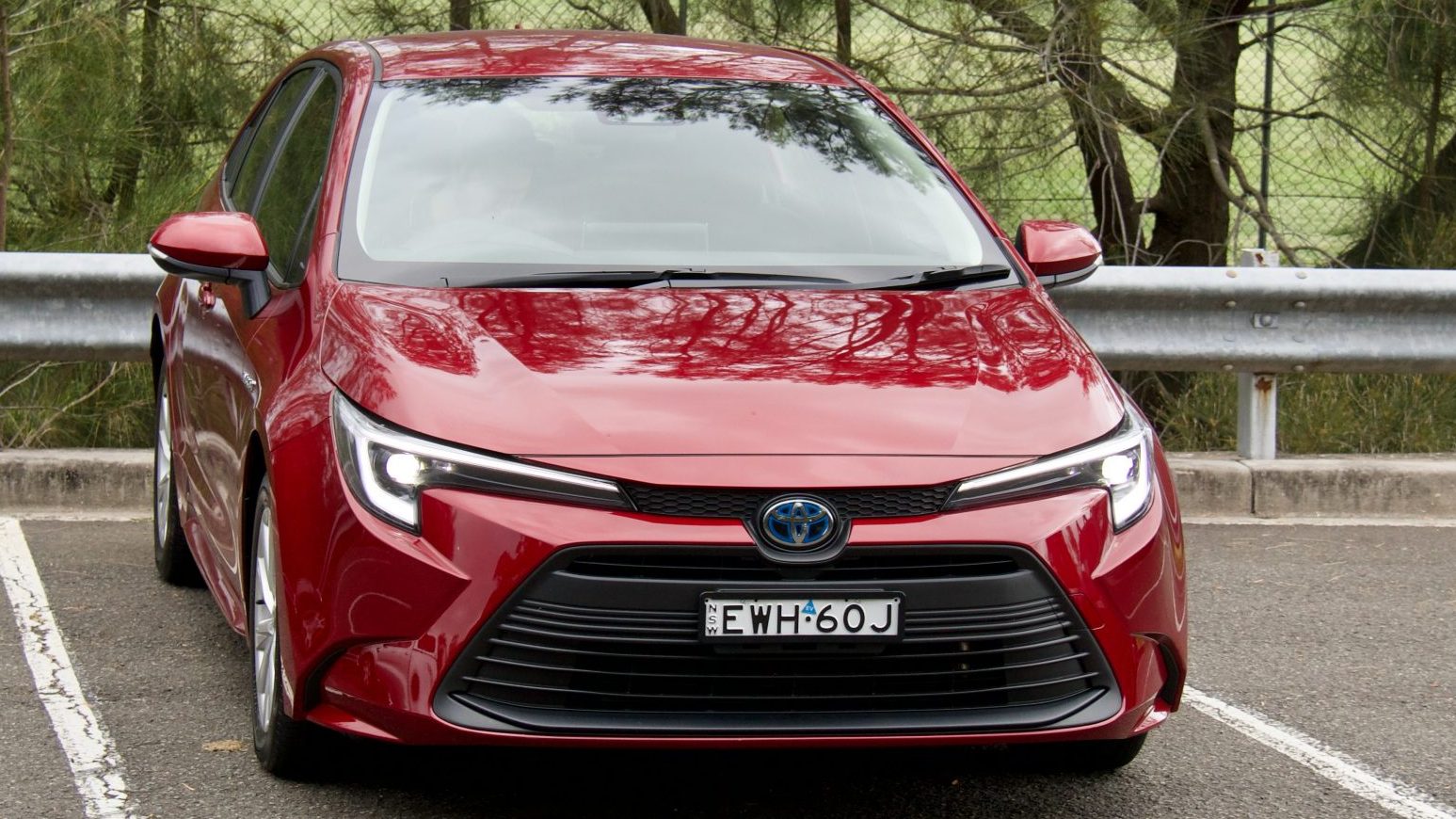
The Corolla sedan carries a five star ANCAP rating courtesy of safety features that include seven airbags (dual front, driver’s knee, dual front side and curtain airbags for both rows), auto emergency braking (AEB) with pedestrian and cyclist detection, lane keep and trace assist, adaptive cruise control with stop and go functionality, automatic high beam, road sign recognition, a reversing camera and the safety features in the Toyota Connected Services system: an SOS button, automatic collision notification and stolen vehicle tracking.
Toyota Offers a Convenience Pack option for the Corolla Ascent Sport sedan, which includes blind-spot monitoring and rear cross-traffic alert, for $1030. The sole standard paint option for the Corolla Sedan is ‘Glacier White’, with ‘Frosted White’, ‘Silver Pearl’, ‘Celestite Grey’, ‘Eclipse Black’, ‘Dark Grey’, ‘Saturn Blue’ and the ‘Atomic Rush’ red of our test car all attracting a $590 premium.
We’d like to see a bit more equipment in the Corolla Ascent Sport Hybrid sedan – after all, it’s no longer a low-$20k car anymore. Conspicuously absent from the standard equipment list are front and rear parking sensors, rear air vents, rear charging ports, a leather steering wheel, blind-spot monitoring, rear-cross traffic alert and auto-folding mirrors.
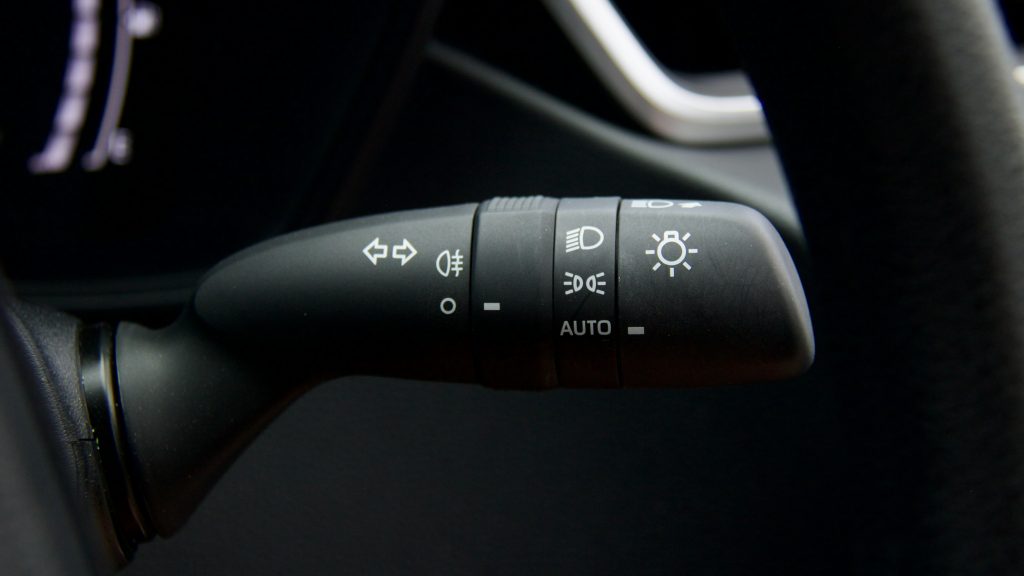
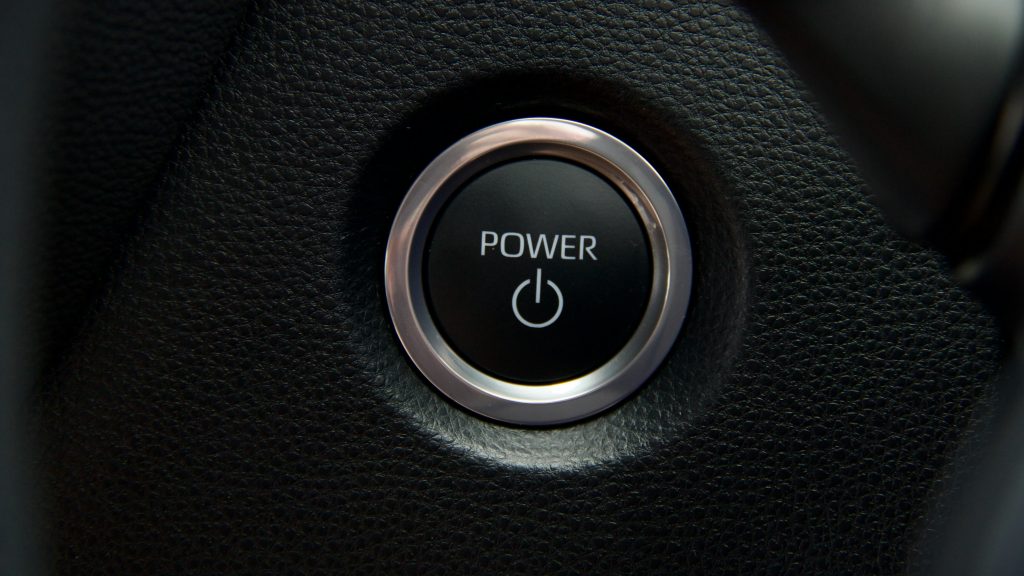
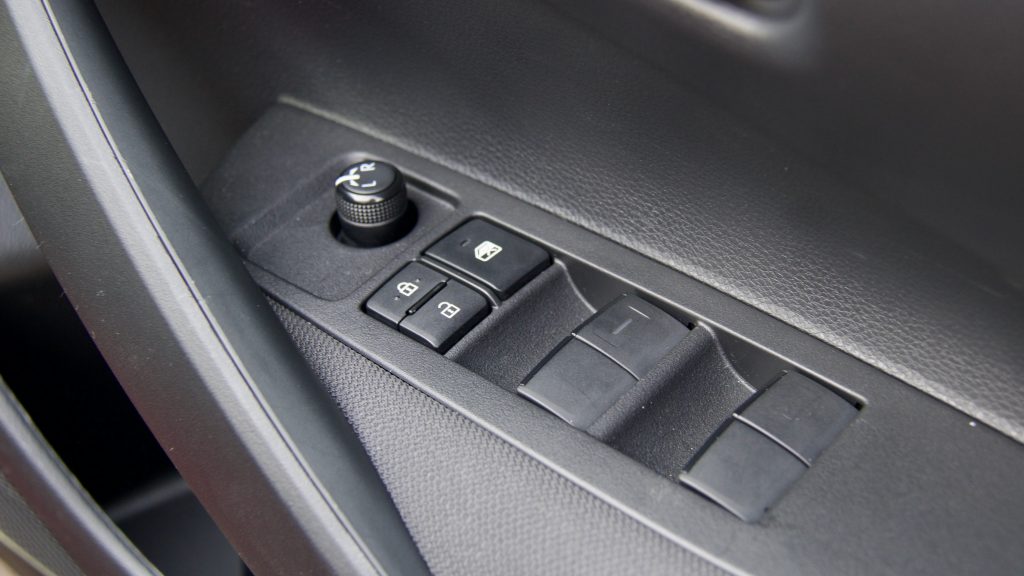
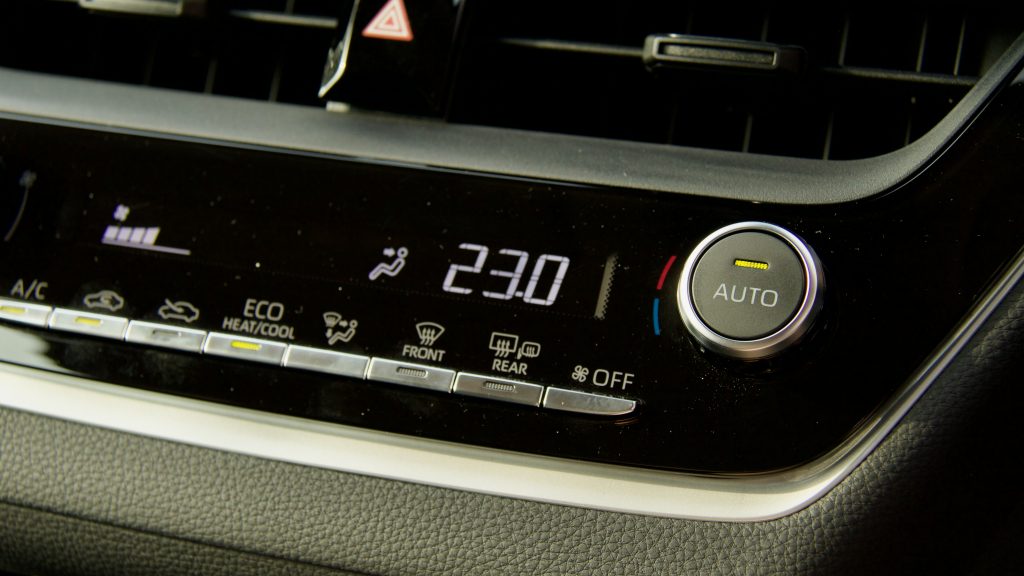
While the sedan market in Australia has gradually shrunk, there are still several sedan competitors to the Corolla Sedan, including the Kia Cerato, Hyundai i30 and Mazda 3, however currently the Corolla sedan lacks a direct hybrid competitor with the Mazda 3 only offered as a mild hybrid- though the i30 sedan will gain a hybrid variant this year. Lack of Hybrid drivetrain aside, we think the Mazda 3 G20 Touring sedan and Hyundai i30 Elite are the closest competitors to the 2023 Corolla Ascent Sport Hybrid sedan.
The Mazda 3 G20 Touring sedan is priced from around $36,300 drive away, and has a substantial amount of equipment over the Corolla, including an auto-dimming driver’s side mirror, 10-way power adjustment for the driver’s seat, two-position driver’s seat memory, larger 18-inch alloy wheels, dual-zone climate control with rear air vents, paddle shifters, a larger 8.8-inch infotainment display, two extra speakers for the sound system, blind-spot monitoring, a leather wrapped steering wheel and gear shifter, auto-folding mirrors, rear parking sensors, rear cross-traffic alert, low-speed rear auto braking, a tyre pressure monitoring system and rear cross traffic alert with braking. The Toyota does counter with a rear fog lamp, wireless Apple CarPlay and connected services including safety and security features and remote connect functionality, but still, that’s a lot more equipment for the Mazda.
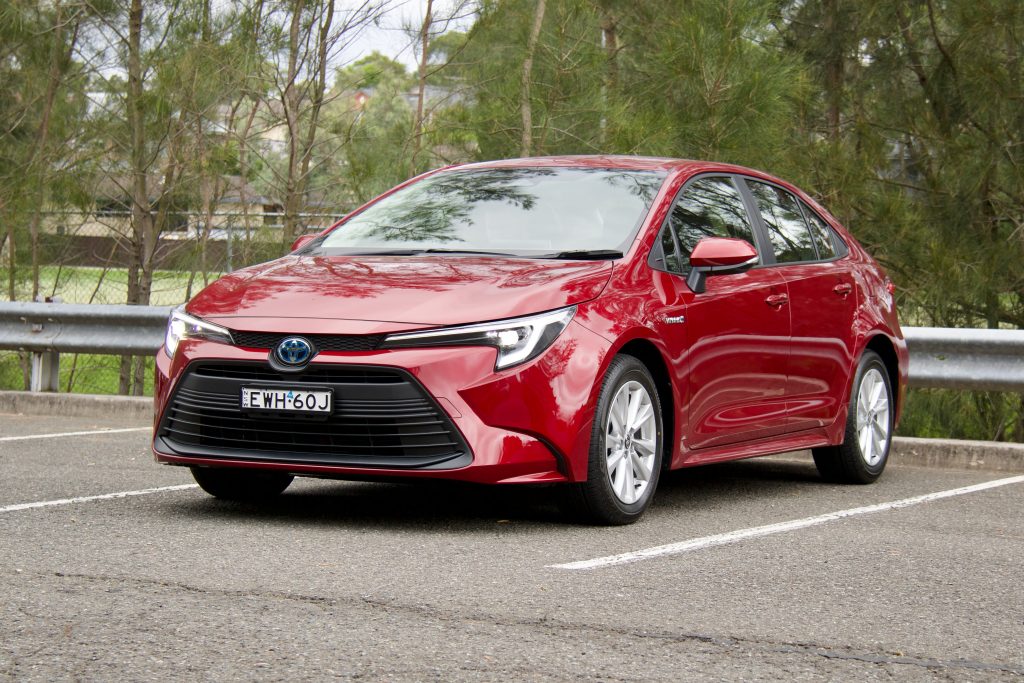
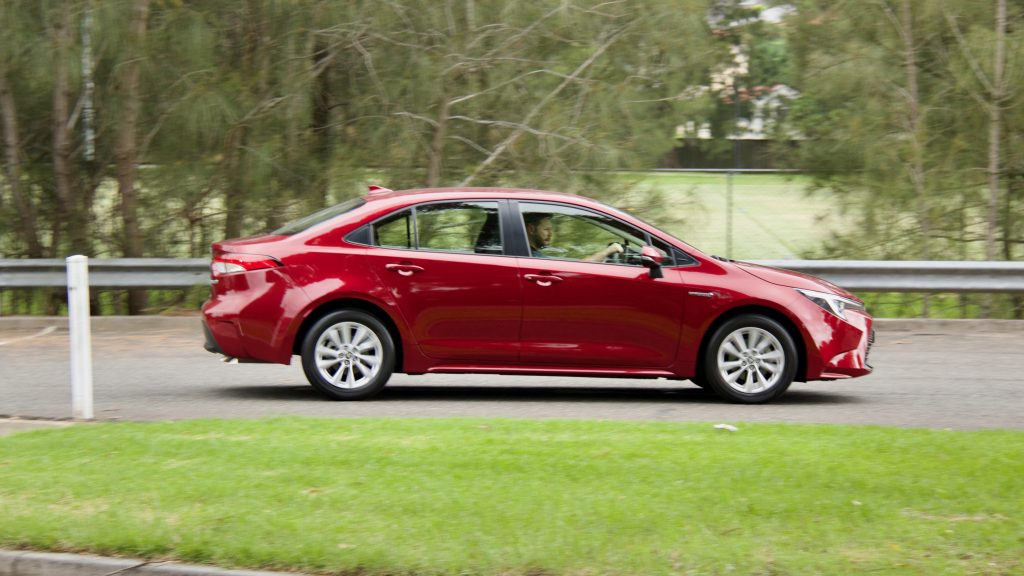
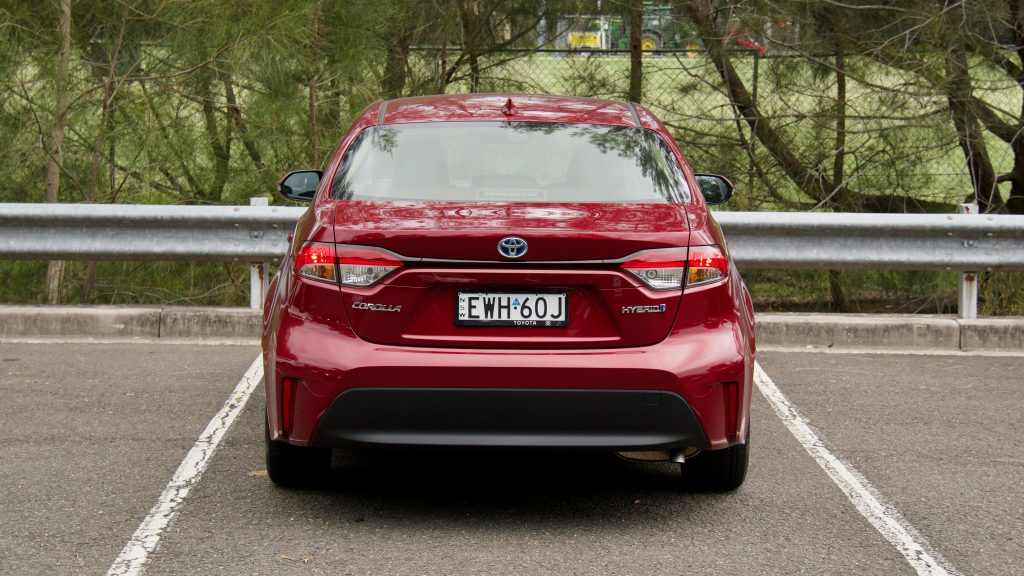
Priced from about $35,800 drive away, the Hyundai i30 Elite sedan also has a fair amount of equipment missing in the Corolla, including 17-inch alloy wheels, blind-spot monitoring and collision avoidance, front cross traffic alert and collision avoidance, safe exit assistance, reverse parking sensors, a tyre pressure monitoring system, a larger 10.25-inch infotainment display, two speakers, leather upholstery, gear knob and steering wheel, a wireless phone charger, a hands-free opening boot, auto-folding side mirrors, a fully digital instrument cluster and dual-zone climate control with rear vents.
A direct comparison with price relative competitors suggests that the Corolla Ascent Sport Hybrid sedan presents poor value due to a lack of equipment, however neither of these competitors are offered as a Hybrid yet, and there is significant value added by the fuel savings Toyota’s renowned petrol electric drivetrain brings. But still, we think the Corolla should have more standard equipment at this level.
Performance & Economy: 9.0/10
The 2023 Corolla sedan range is offered with a choice of either a naturally aspirated 2.0-litre petrol engine or the 1.8-litre petrol electric hybrid drivetrain as our test car was equipped with. Toyota revised the Corolla’s Hybrid system for the 2023 model year, labelling the new drivetrain as its ‘fifth generation hybrid system’, with enhancements to the electric motor, the generator, power control unit and notably a switch from the tried and tested Nickel-Metal Hydride battery technology to the much more modern and lighter Lithium-Ion technology.
The result of the revision is a 13kW power increase over the old hybrid system for a total combined output 103kW, and it’s noticeable. The old hybrid was slow, but serviceable – by contrast the tweaked hybrid feels far more fit for purpose. The Corolla sedan will run purely on battery power to higher speeds than before, and the petrol engine switches off more frequently. Pushing the new hybrid system harder when brisk acceleration is required is a far less painful experience than before, with claimed the claimed time for a 0-100km/h sprint reducing from over 12 seconds to just over nine seconds.
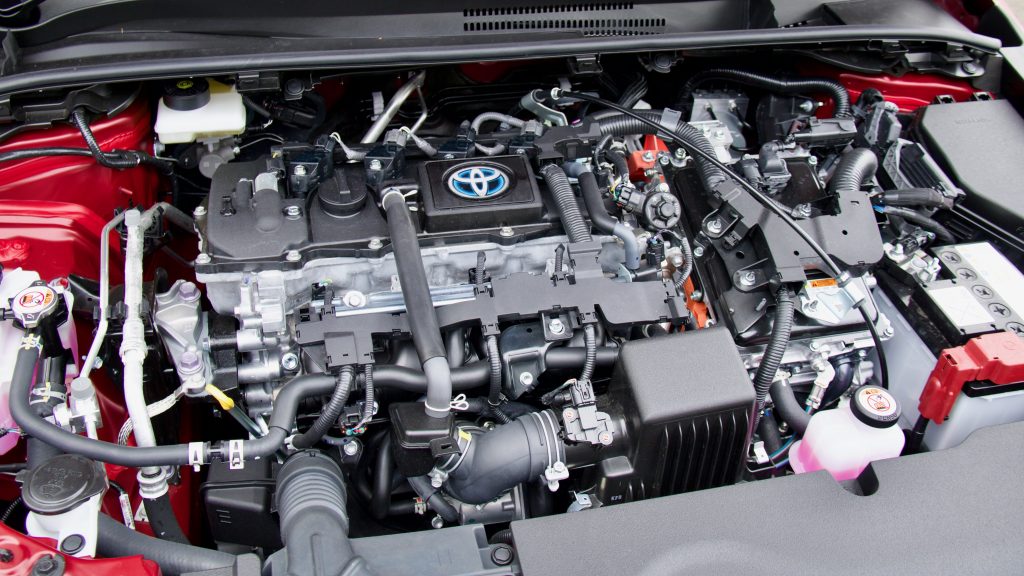
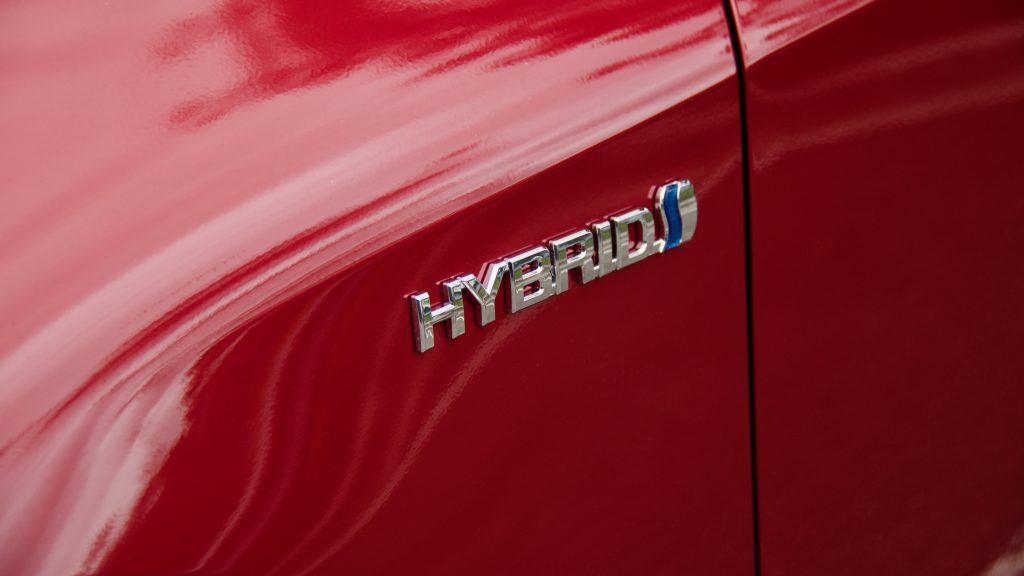
Toyota’s years of Hybrid expertise is evident in the smooth transition between hybrid and electric propulsion – barely anything can be felt in the cabin, through the steering wheel or the pedals. The drivetrain is silent, apart from the typical EV whirr, and even when the petrol engine kicks in things are still pretty refined, and given the aforementioned improvements to the hybrid system, the engine is heard less often. Things only tend to get loud during heavy acceleration, where the eCVT transmission drones and things get a bit less civilised.
The Corolla sedan feels at home around town, with the the instant torque of the electric motor making acceleration feel more nippy than the output figures would suggest. The boost in power has made the Corolla a more comfortable highway cruiser – the drivetrain will run in fully electric mode more often, and getting up to speed is easier. Overtaking requires less effort and planning than before, though the Corolla Hybrid is definitely more comfortable in town. The eCVT transmission works well most of the time, though we’d like at least an option to simulate a torque converter under heavy acceleration, like Honda Hybrids do.
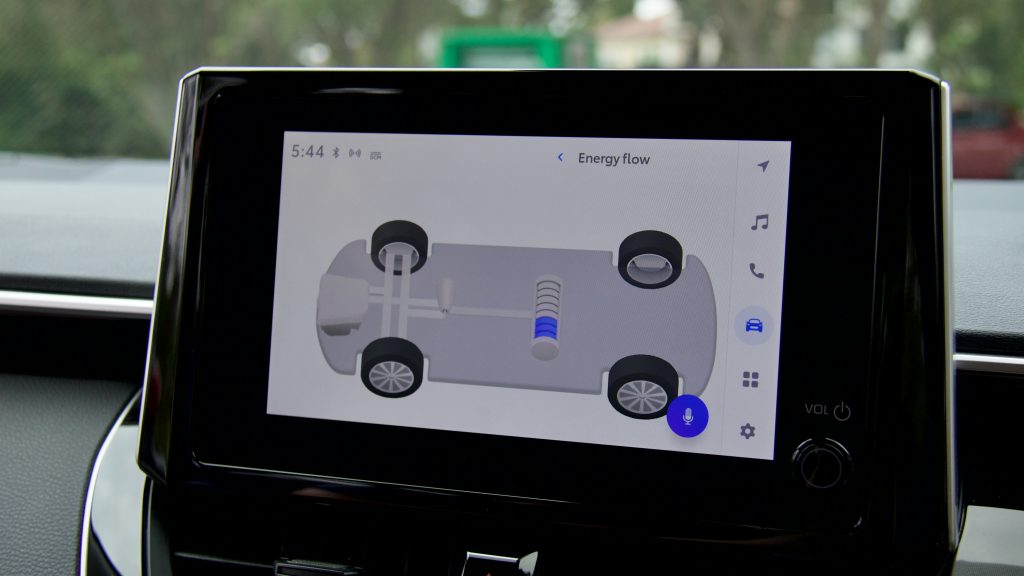
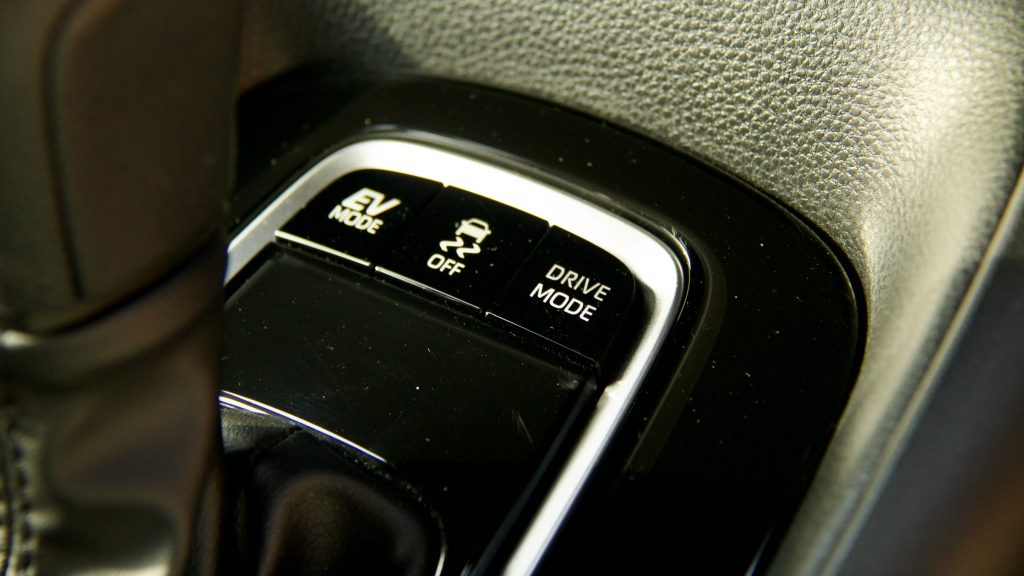
Toyota claims fuel usage of 3.9L/100km, which impressively, we were able to match during our week with the Corolla, which was spent across a fairly even spread of highway, suburban and heavy traffic. It’s possible to get this figure even lower – with careful driving we saw individual trips with fuel consumption dropping down to 2.8L/100km, which is very efficient.
Kudos to Toyota for increasing the power output of the hybrid drivetrain, without increasing fuel usage. Interestedly we’ve seen better fuel economy out of the sedan than the hybrid hatch – we think the sedan must have a bigger battery (not confirmed by Toyota) and a more aerodynamic shape. Achieving the fuel efficiency we did should enable an impressive driving range of 1100km on a single 43-litre tank of petrol.
Ride & Handling: 9.0/10
When the current generation of Corolla hatch was launched back in 2018, many were surprised at the leap from the previous generation’s merely adequate dynamic package, to being amongst the best handling hatches in the class. The good news is that though the sedan may have a more conservative exterior design, it also sits atop Toyota’s transformative TNGA platform.
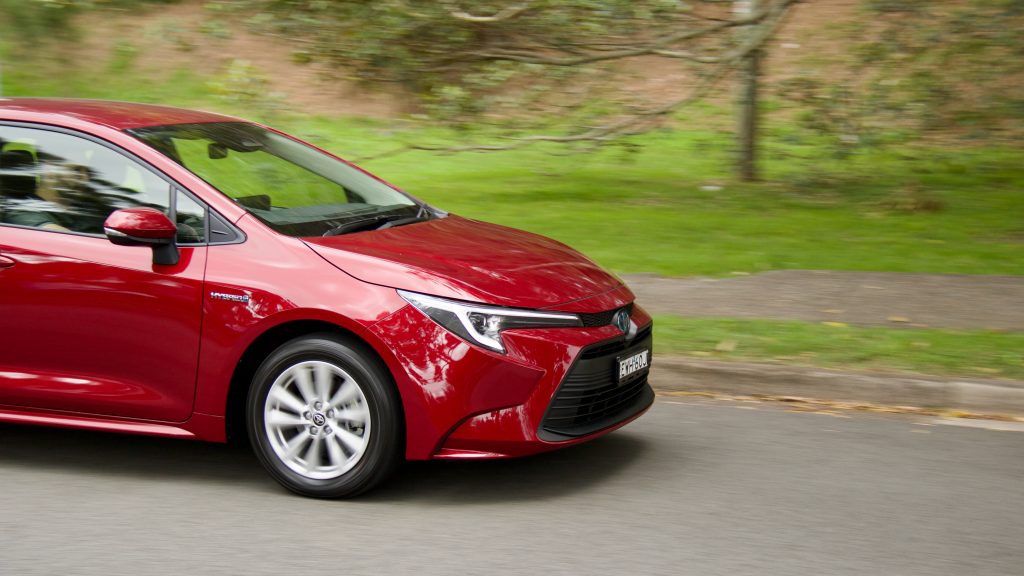
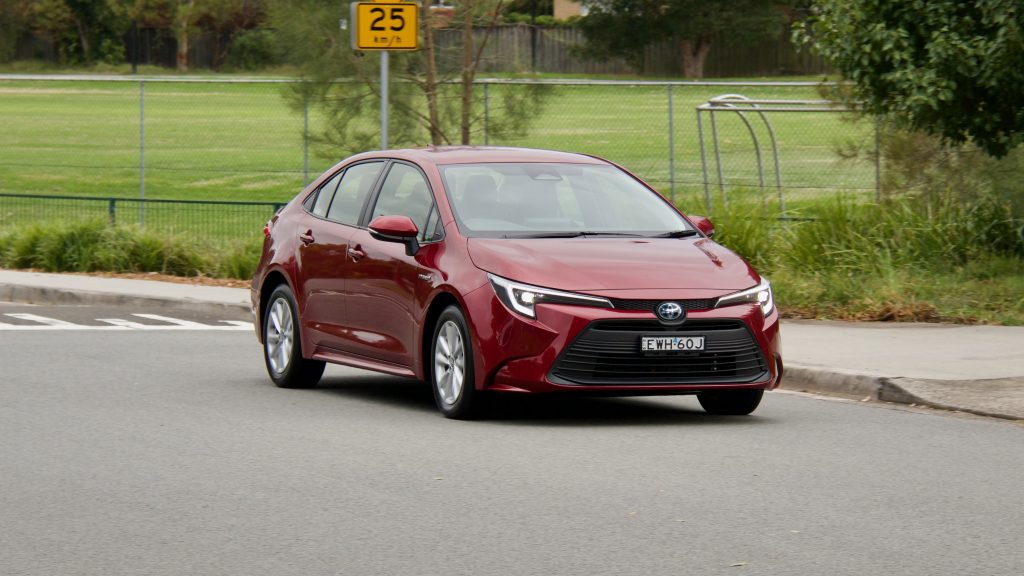
That being said, while it comes close, the sedan isn’t quite as keen a handler as the hatch, with a smidge more body roll when pushing harder through corners – though it’s still surprisingly nimble with a chassis that can be pushed a lot harder than the drivetrain (or the economy tyres) will allow. Body control is very good for a small sedan, and the low centre of gravity keeps the Corolla sedan well planted through corners – even though we suspect most small sedan drivers won’t drive their Corolla hard, it’s nice to know that it can actually be an enjoyable car to punt around in. For drivers who want to get from A to B, things will feel predictable and safe for normal driving.
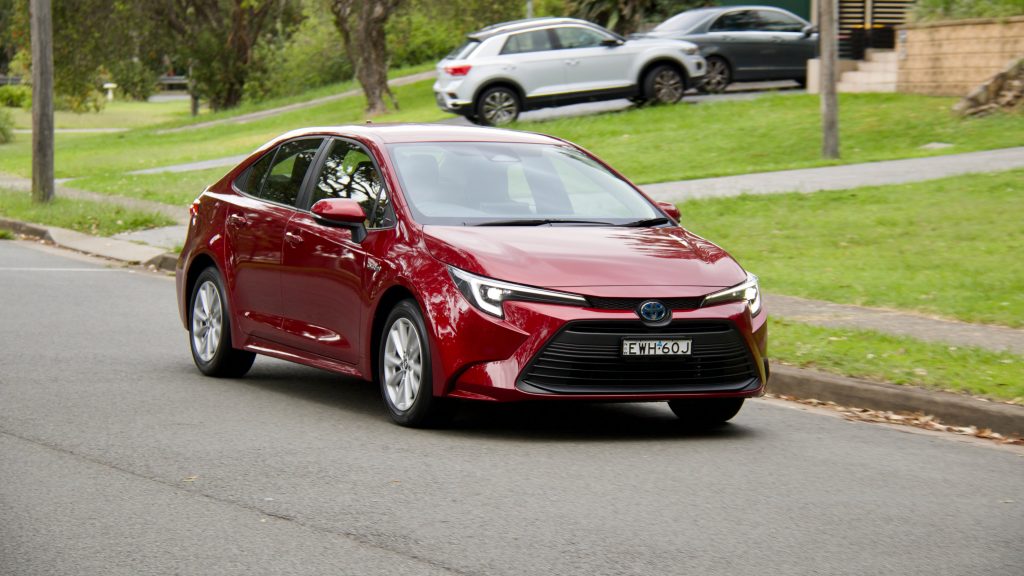
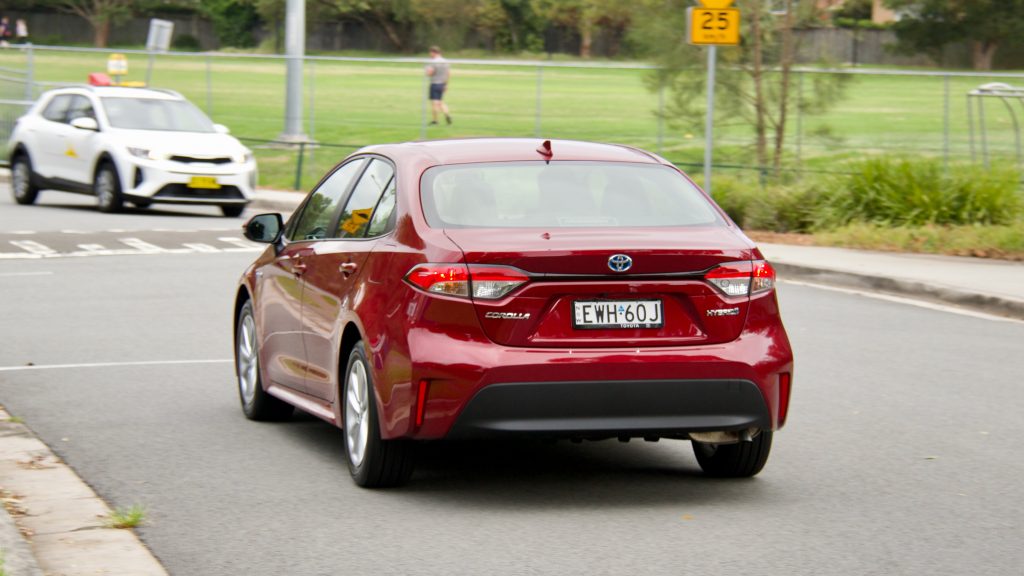
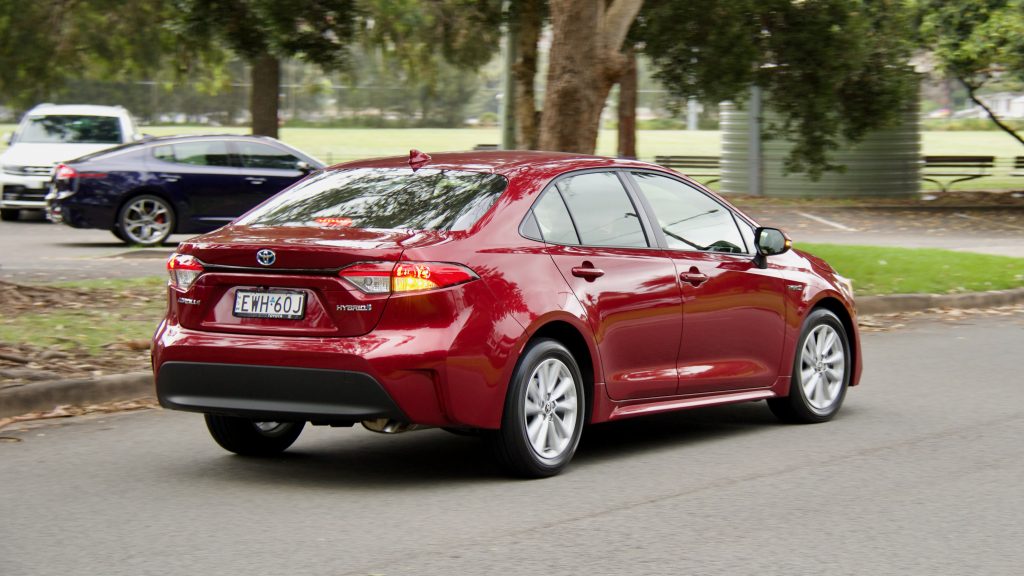
We found the the steering to be well weighted with a quite natural feeling – it’s precise and lends itself to easy manoeuvring around suburbia, but also inspiring confidence when pushed harder. The ride quality of the Corolla is comfortable, with a great suspension tune. The independent rear suspension, which is more sophisticated than the simple torsion beam setup on the i30 Elite and Mazda3 helps keeping the ride very settled and poised even over rough surfaces and the myriad of imperfections that Australian roads are full of.
Everything thrown at the Corolla Sedan is soaked up with aplomb, and the ride is slightly more comfortable than the hatch. Noise suppression is also great, with the cabin being quite well isolated from road and wind noise, it’s only at highway speeds that noise intrusion becomes apparent.
Interior & Practicality: 8.0/10
Stepping inside the 2023 Corolla Ascent Sport Hybrid sedan reveals a modern, typically (modern) Toyota space in that it’s not revolutionary but it’s well designed and laid out. Everything feels solid and well put together with high quality, but unfortunately often hard to the the touch, materials. The top of the dashboard is soft to the touch, plus the centre armrest and door arrests are both covered in fabric, but otherwise, the the whole lower dash, centre console sides and door cards are hard plastic, which knocks the ambience of the cabin down a few notches. We definitely feel this all feels a bit low rent for a $36k car, and worst of all is the plastic steering wheel. Toyota, the Corolla isn’t a low $20,000 car anymore – a leather steering wheel should be standard equipment given it’s the most common touch point throughout the whole interior.
Luckily, the great quality switchgear with excellent dampening does help the interior gain a bit of ground. There are flourishes of piano black and faux metal throughout the interior, which helps to add a bit of interest to the design. There are a reasonable number of storage spaces in the front row, which includes a capacious centre console box, door bins with bottle holders, a tray ahead of the gear shifter, a good sized glovebox and two cupholders – though there is no sunglasses holder.
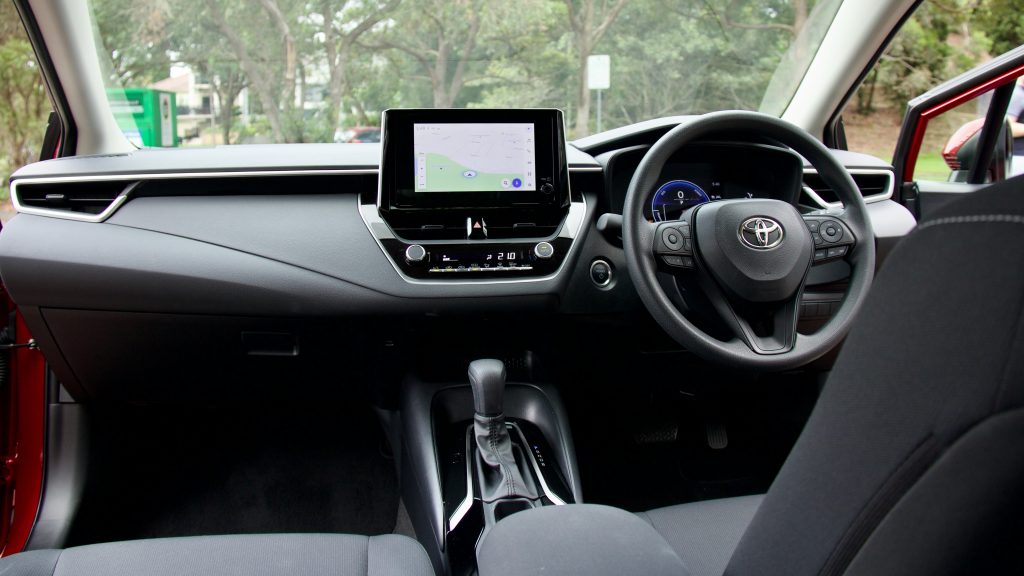
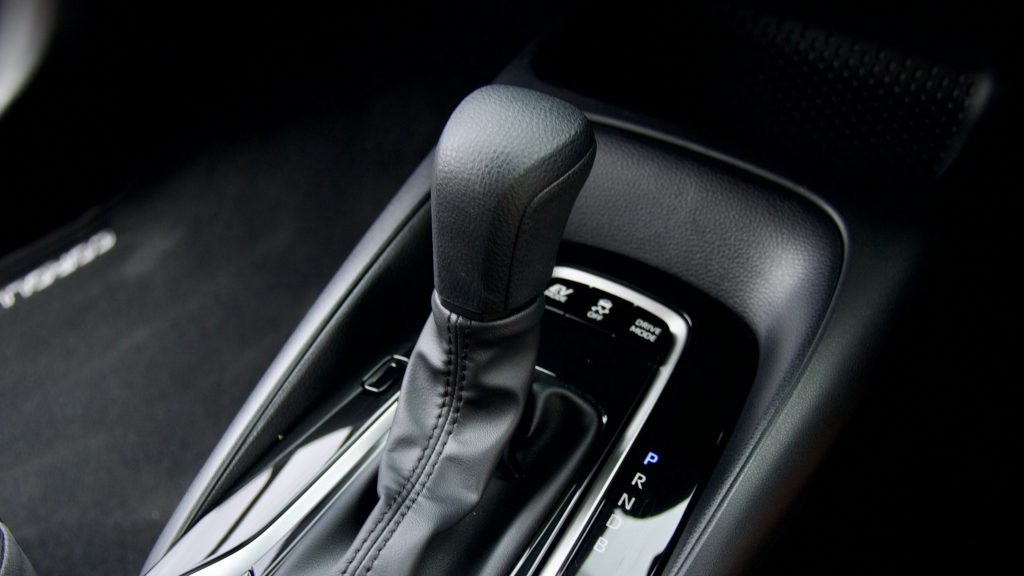
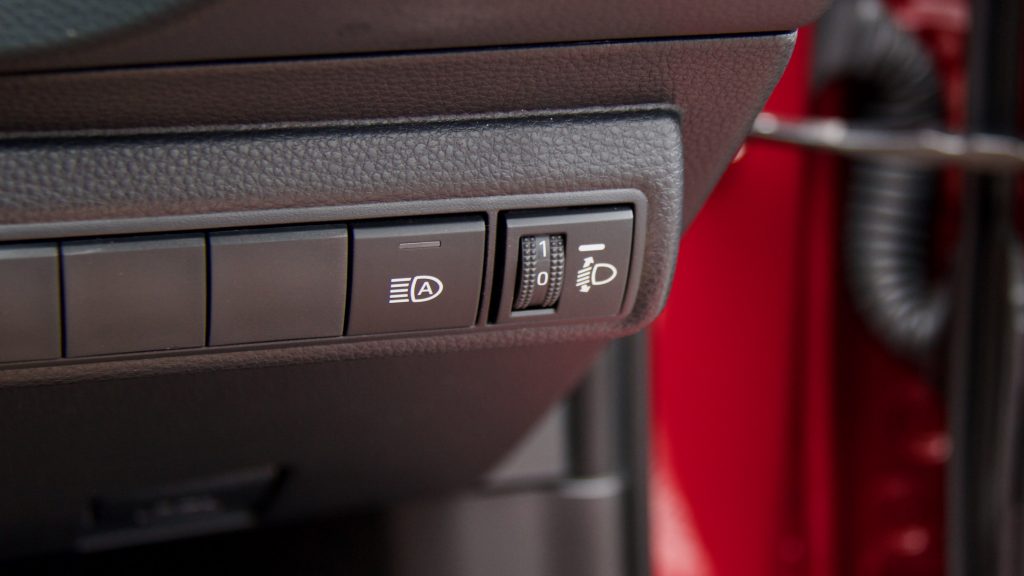
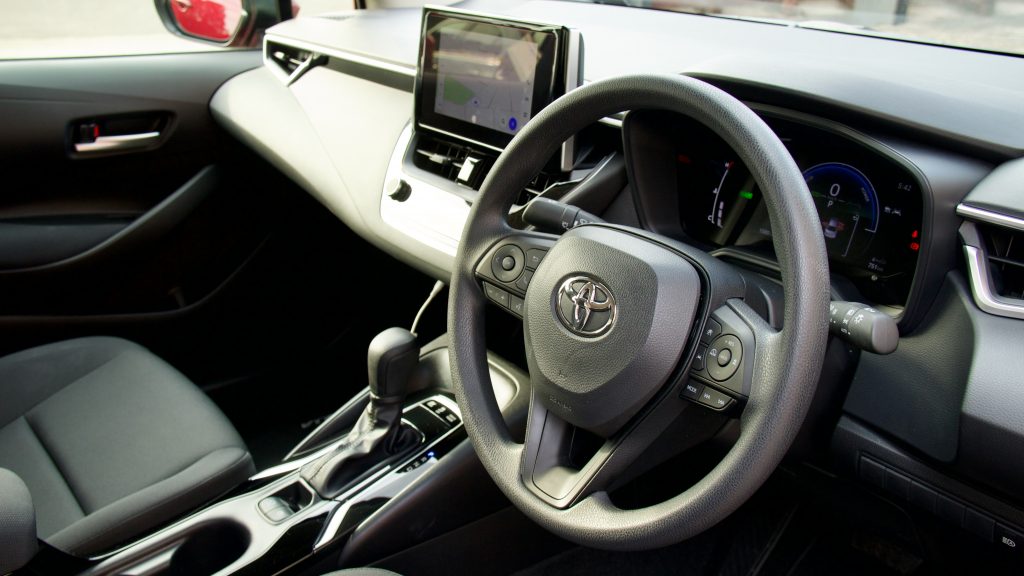
The seat fabric has an interesting stitched design which feels great to the touch, and the seat themselves, which aren’t as bolstered as the hatch, are comfortable. They feature good bolstering and lumbar support and most drivers will be able to find a comfortable seating position with six ways of manual adjustment. The driving position is good, and there is good visibility all around – adding to the comfort is the sliding adjustable armrest which is a nice touch in a base model car. We do think the passenger seat needs height adjustment, as taller passengers have limited headroom.
The 7 inch digital drivers’ display is new to the 2023 Corolla, and while it feels more modern than the old 4.2 inch display, it’s a bit two steps forward one step back. Drivers no longer have the option to see an analog speedometer, though can now see the digital speedometer at the same time as driving data. The larger screen shows exactly the same amount of driving data display area as the old 4.2-inch display. We think it’s a bit of a step back from the old 7.0-inch screen, with the huge amount of area given to the massive fuel and temperature displays, which again looks more modern, but perhaps less functional. A better layout would make much better use of the screen real estate and allow drivers to see more data at the same time.
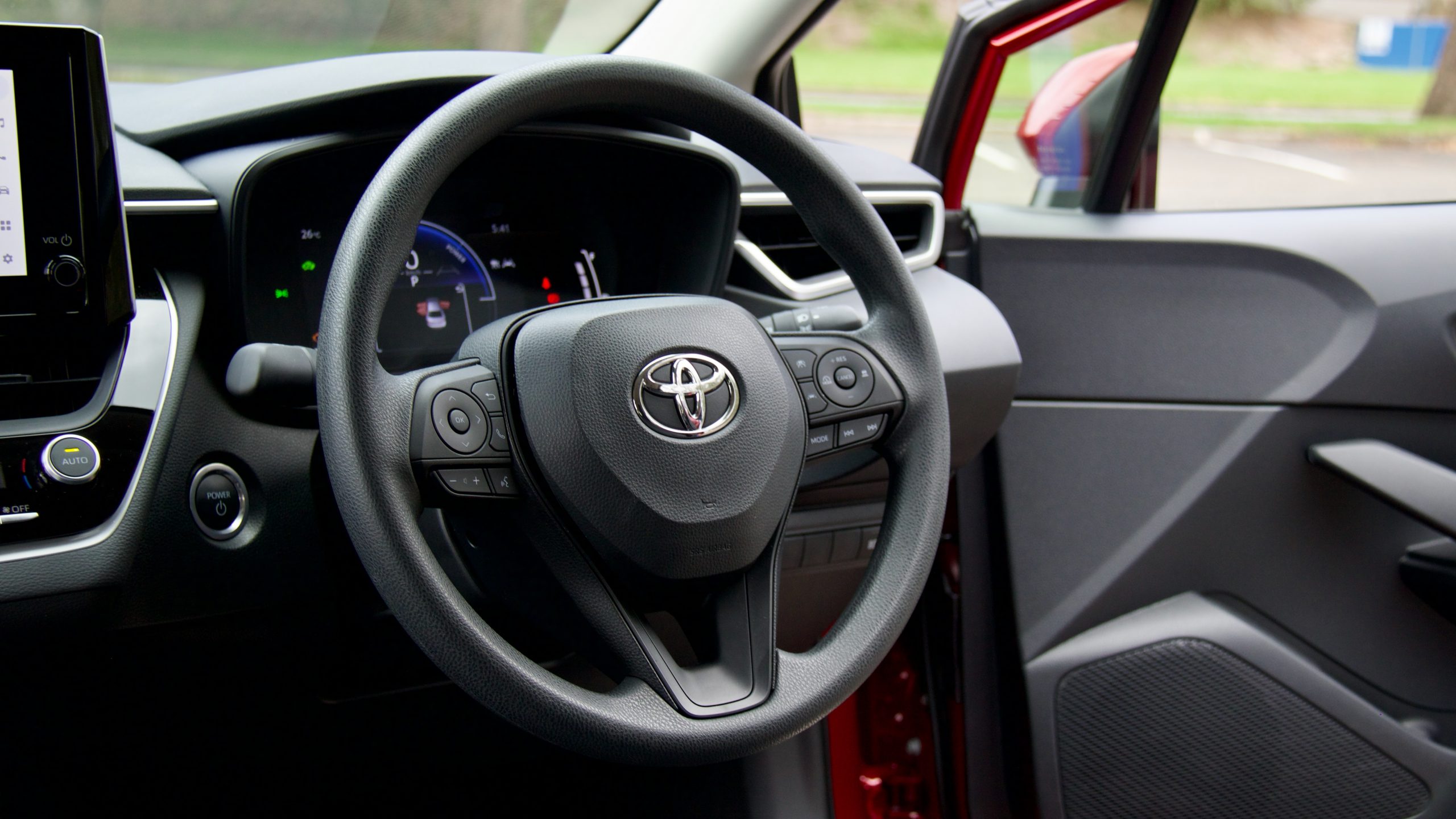
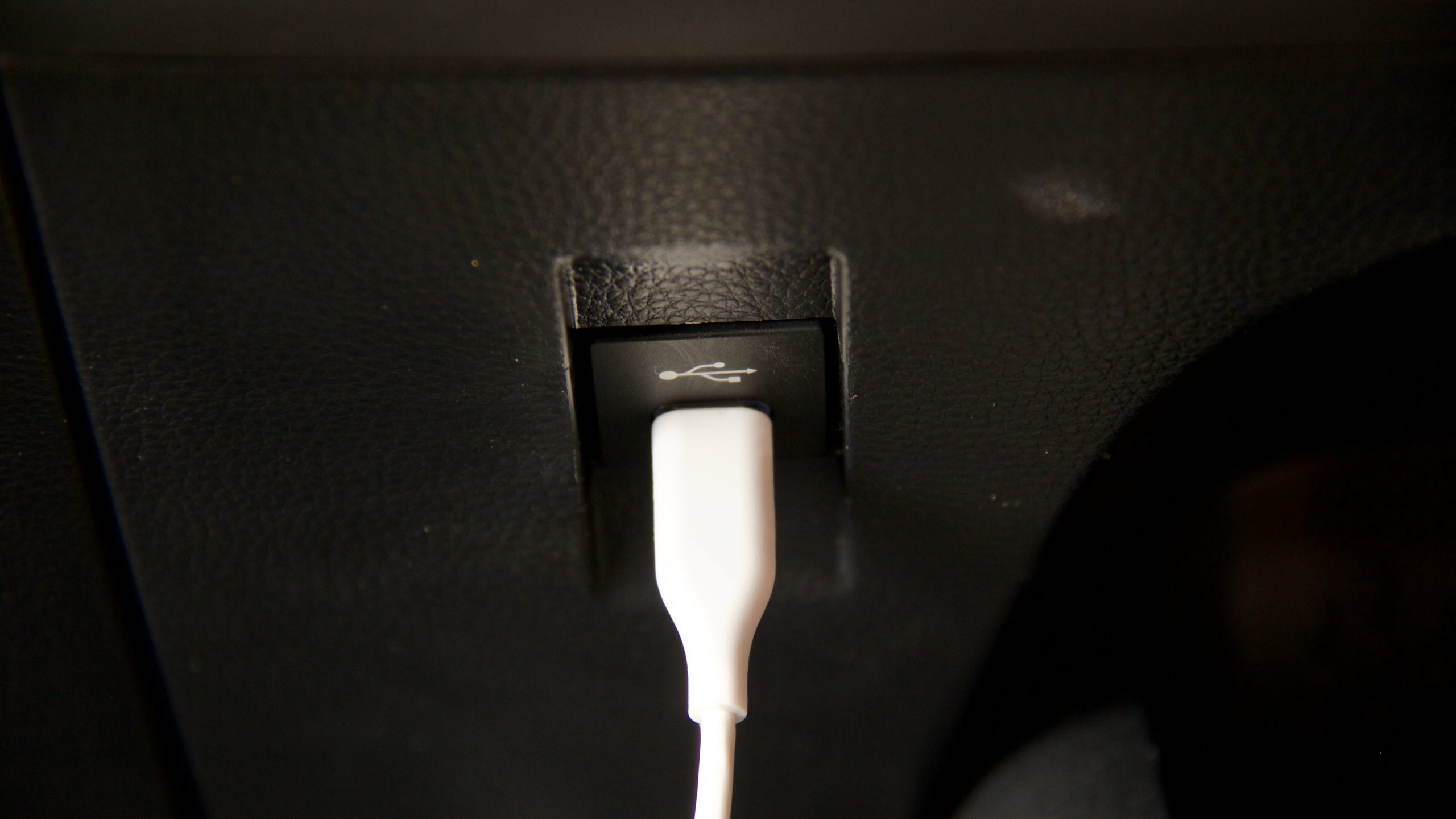
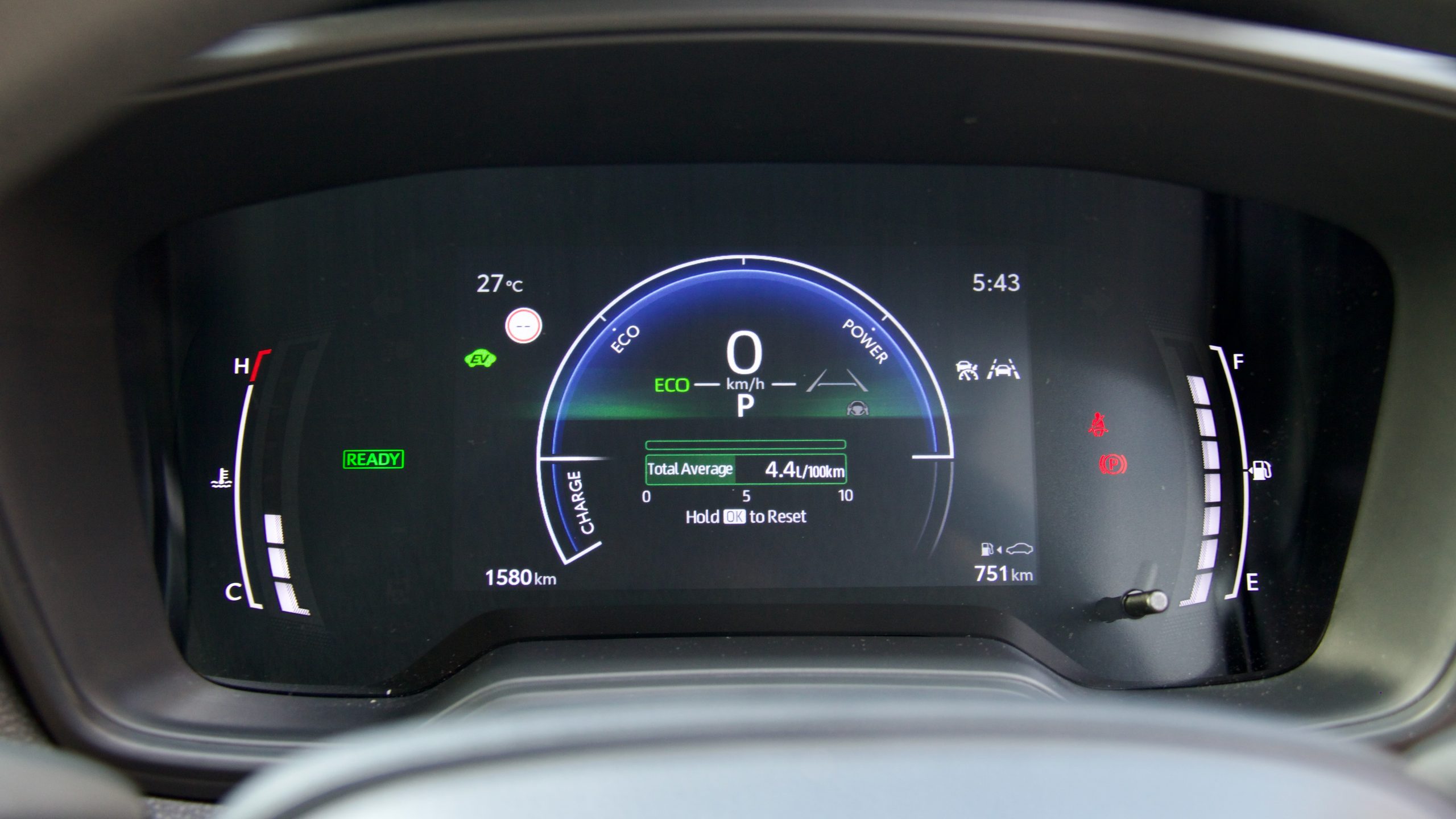
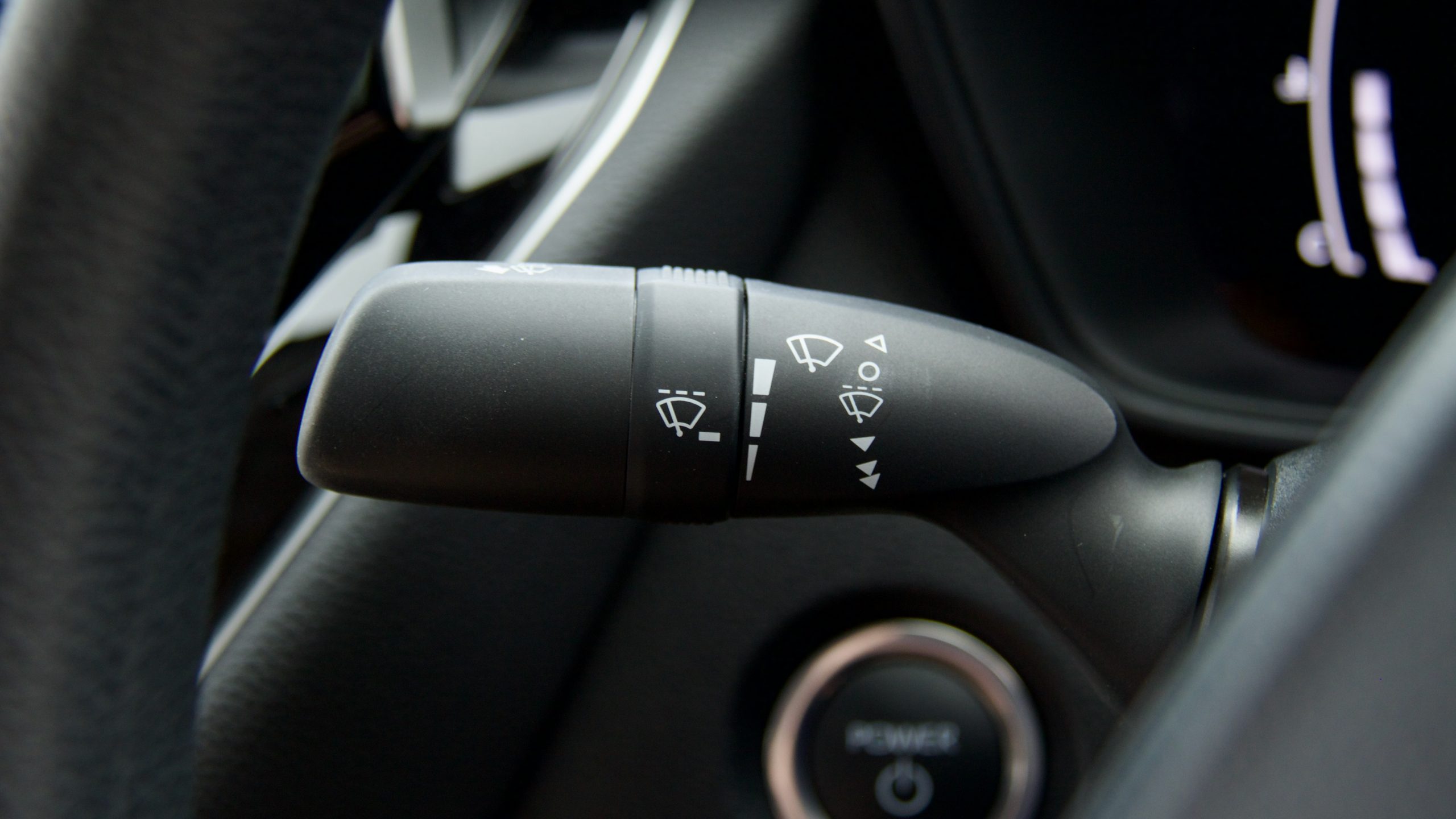
Infotainment has also been updated for the current Corolla, with a new screen and software – in this instance its a 3 steps forward, one step back improvement. The screen remains the same 8.0-inches, but the handy shortcut buttons which flanked the sides of the screen are gone, which is the main backwards step. It makes the system harder to use, but also makes the screen feel smaller as it now has a large black bezel surround, with plenty of empty space. Thankfully the volume button has remained. Luckily the new screen is an improvement in fluidity and clarity over the old unit. The new software is also great – it’s snappy and far more modern – bringing the Corolla in line with its competitors in the infotainment stakes.
DAB/FM/AM radio is standard, along with Bluetooth and USB audio. CarPlay is offered with wired and wireless connectivity – an advance on the old system. Android Auto remains wired only. We found the wireless CarPlay implementation to be one of the best we’ve ever tested. Apart from the very occasional audio skip, it was fast to connect and we didn’t run into the myriad of problems we’ve encountered in many other wireless CarPlay enabled head units in competitors. We were however disappointed to see that the new high quality reversing camera found in the Corolla Cross hasn’t made its way to the normal Corolla – it’s still the old subpar low res camera that now looks even worse with the higher quality screen.
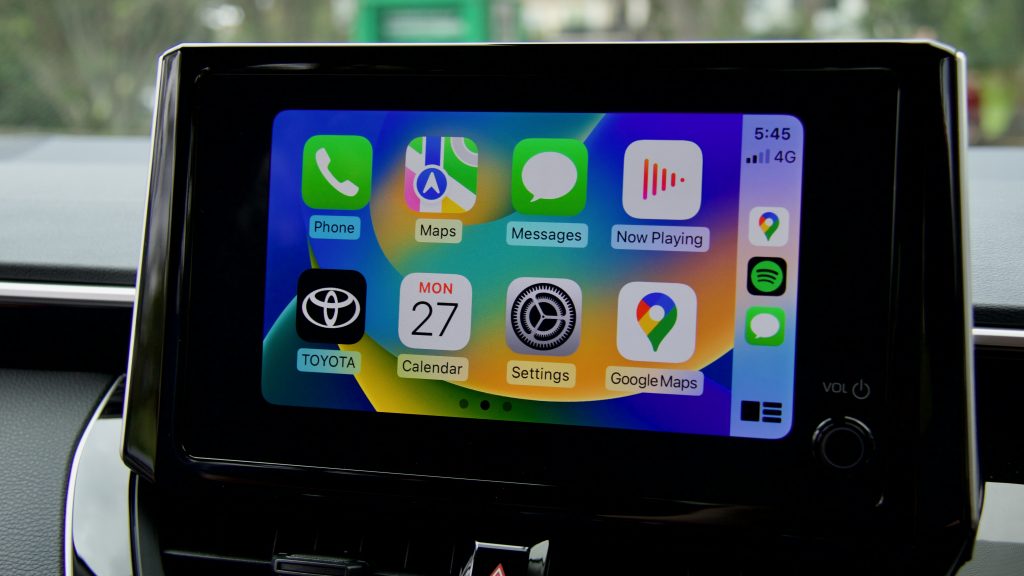
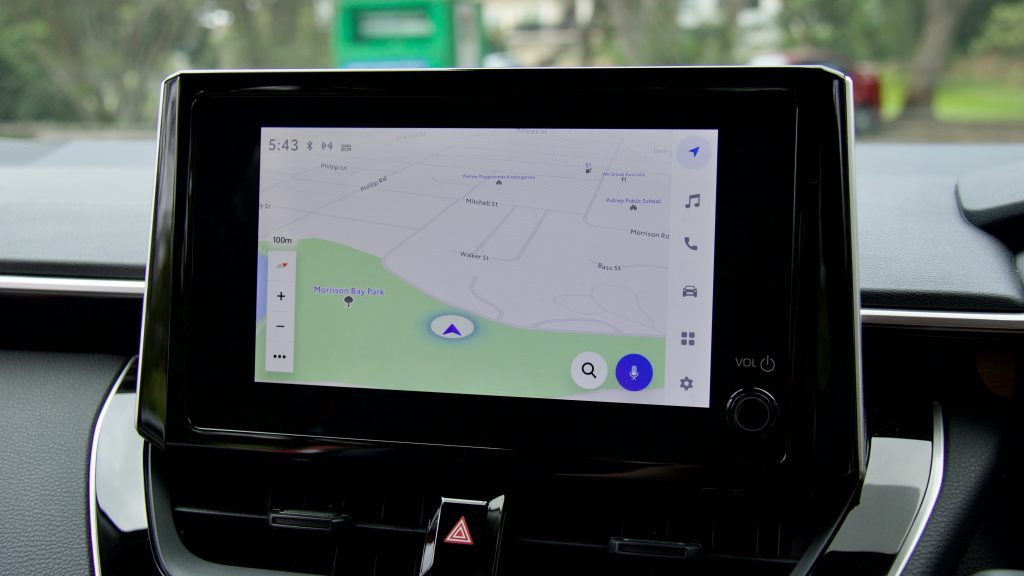
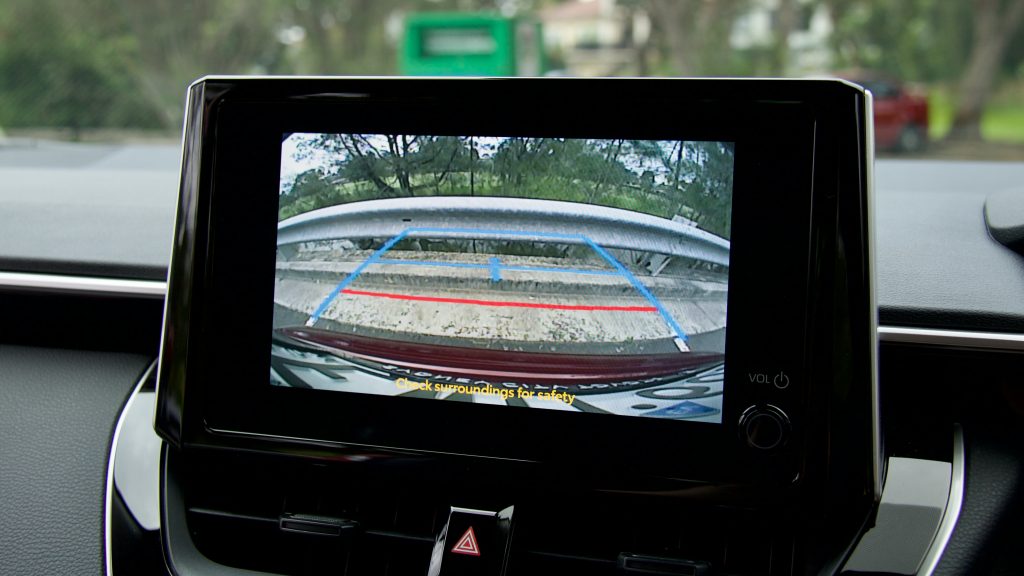
There is one USB-A charging point on the dash and a USB-C charging point in the centre console box. Special mention must also go to the upgraded microphone system – using Siri (for example) is very accurate. What’s more impressive is that the microphone system can distinguish which seat a command comes from.
The new Toyota voice control system depends on this to work out which seat a command comes from, and thus (for example) which window to open. However, saying ‘Hey Toyota’ and then ‘open a window’ isn’t a huge time saving over simply using the window switch. The better usage of this connected system is using the remote functions through the ‘Toyota Connected Services’ app, which lets users remotely start the car, turn on the air-conditioning and other useful functions – though these functions are only available free for a year – they become part of a $9.95 a month subscription.
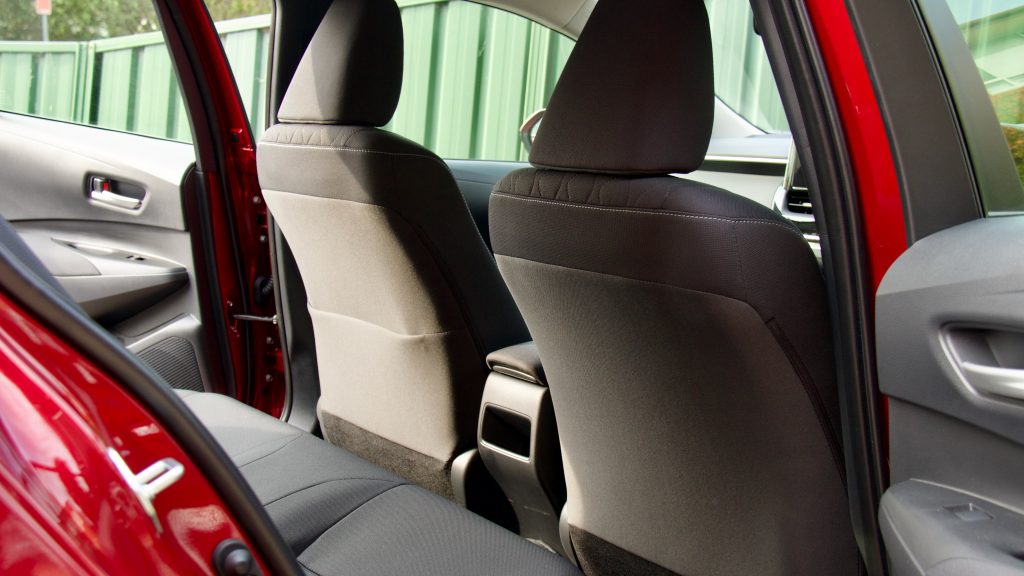
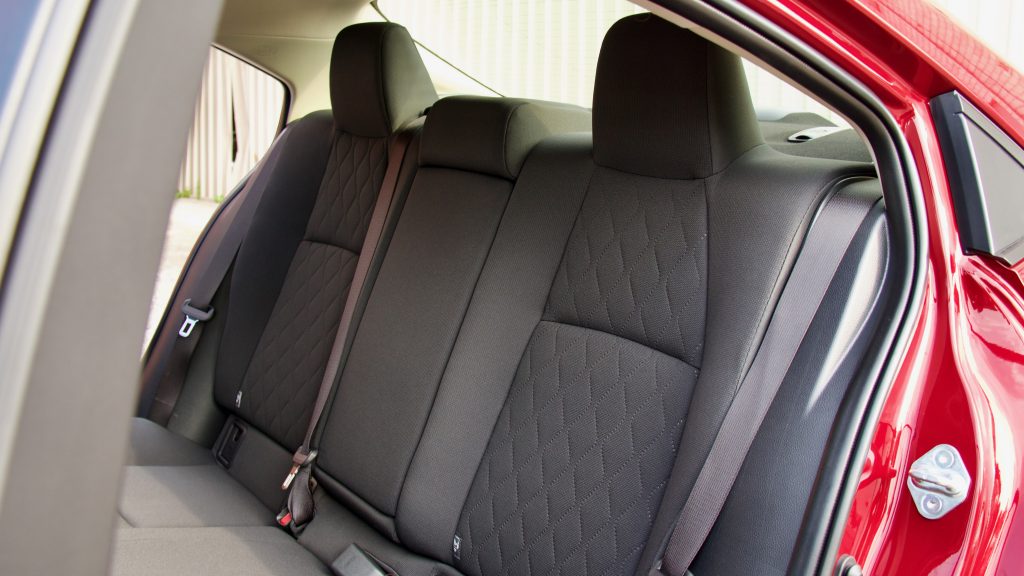
The rear row of the Corolla sedan is a capacious area, and the extra room over the hatch is quite noticeable and a key selling point of choosing the sedan. There is plenty of head, knee and leg room for two adults, even taller adults have enough room, making it a comfortable space even for longer trips – the front seat passengers don’t need to compromise on their space to accommodate rear passengers. The middle seat, like many other cars in this class is less serviceable than the two outbound seats due to the transmission tunnel and smaller seating area, but its still more than okay for children and for adults on quicker trips. Amenities for rear seat passengers are limited, with a fold-down centre armrest, a single map pocket and door bins with drink holders rounding out the list. There are no rear vents offered on any grade of Corolla sedan unfortunately, which is a strange decision, given the top spec ZR hatch does feature vents, despite having a rear seat that is much less usable than the sedan.
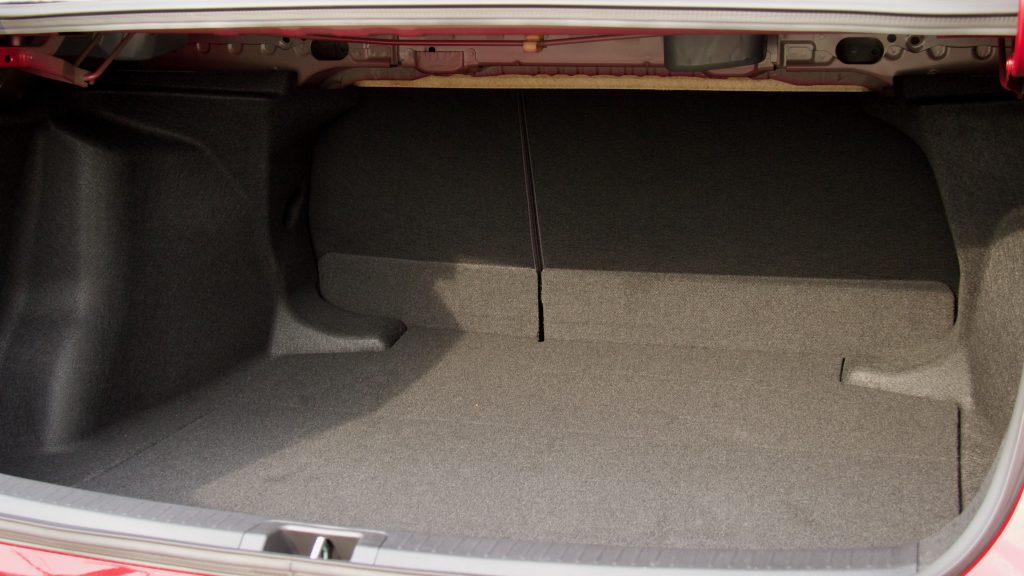
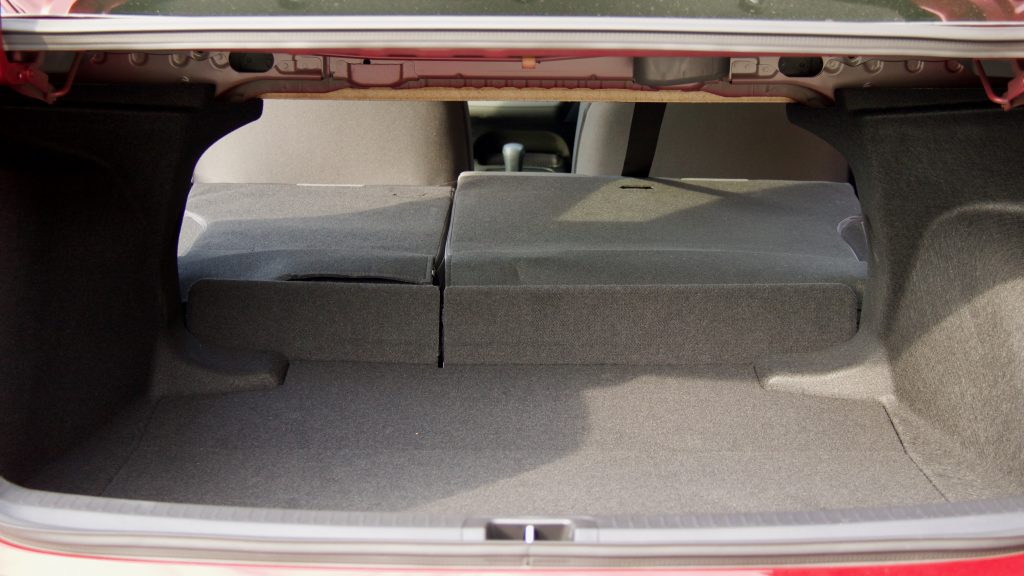
Opening the boot reveals a commodious 470-litre space – over double the space in the hatch. It’s larger than the 444L boot on offer in the Mazda3, and a mere 4L less than the i30 sedan boot. It’s a pretty basic area, with not much going on in terms of clever storage spaces. We do like that unlike many sedans of the past, the boot can be opened via a button in the tailgate or button on the remote – like a hatchback. Under the rear floor sits a space saver spare – not ideal but a space saver is better than a tyre repair kit!
Service & Warranty: 9.0/10
Toyota provides a five-year/unlimited kilometre warranty for the Corolla, with an additional two years of warranty for the drivetrain if servicing is carried out as per the logbook requirements, and there is an additional five years of coverage for the hybrid battery, if an annual hybrid battery health check is carried out (included as part of Toyota servicing). Hyundai gives the i30 an identical warranty, as does Mazda with the 3, however neither extend the warranty on the drivetrain like Toyota does.
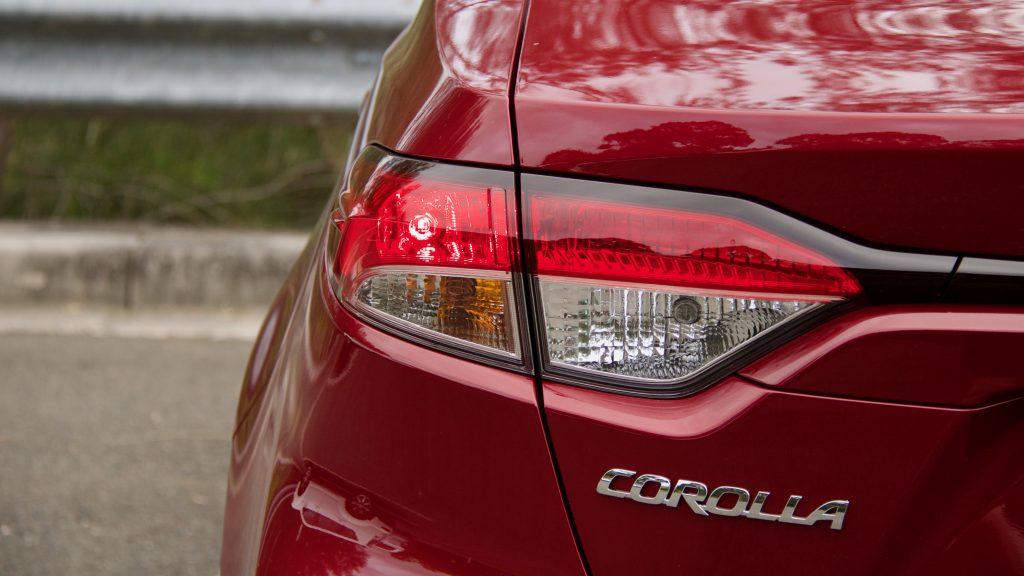
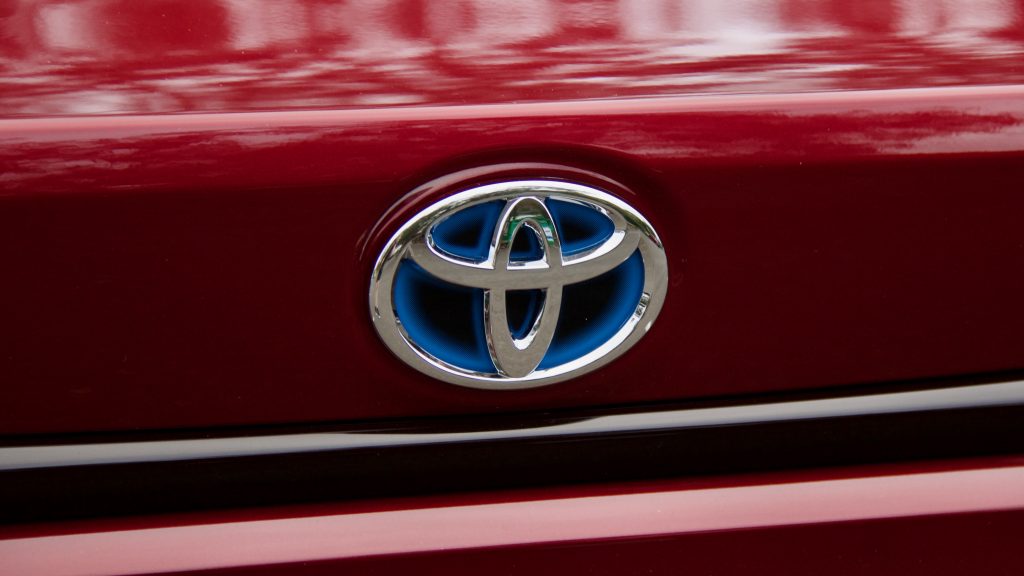
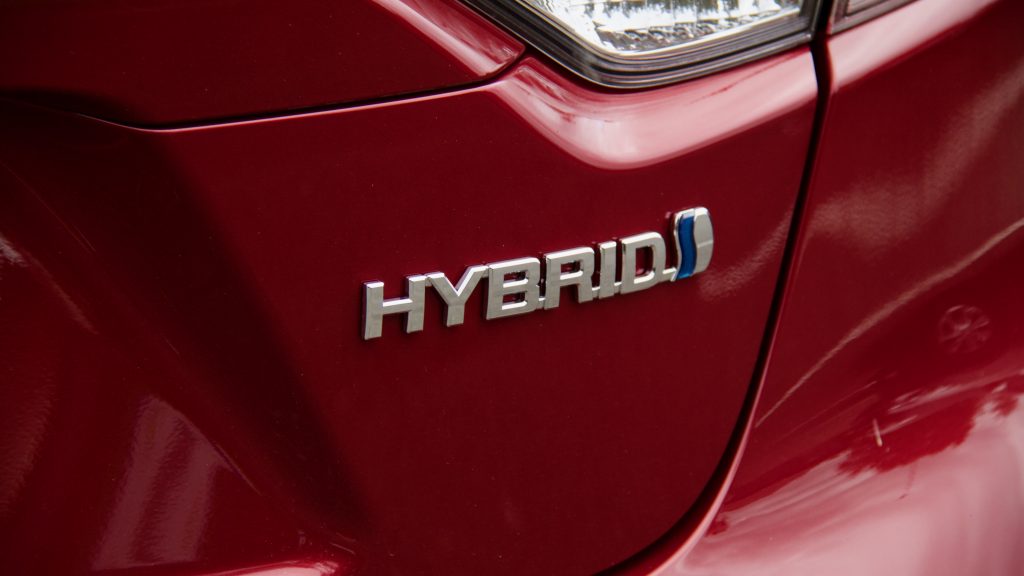
The Corolla has capped price servicing for the first 5 years/75,000kms travelled, which costs a low $1,225 – service intervals are 12 months/15,000kms (whichever comes first) Hyundai’s capped price servicing program for the i30 sedan is for the lifetime of the car, but costs more at $1,495 over the first 5 years/75,000kms and service intervals match the Corolla’s. The Mazda3 has five years/50,000kms of capped price servicing, which costs a pricey $2,021 for the first five years, or 50,000kms.
Both Mazda and Hyundai best Toyota in the roadside assistance stakes – Mazda includes five years of roadside assistance, and Hyundai includes 12 months, but this is extended by an additional 12 months with each logbook service carried out at a Hyundai dealership. The Corolla on the other hand has no included roadside assistance.
The 2023 Toyota Corolla Ascent Sort Hybrid Sedan DiscoverAuto Rating: 8.5/10
While sedans are on the decline, the 2023 Toyota Corolla Ascent Sport Hybrid sedan makes a great case of why Australian car shoppers should give the three-box shape another look. With a roomy interior, massive boot, exceptional economy, great warranty and service package and a surprisingly capable chassis, the Corolla sedan addresses the boot and rear seat shortcomings of the hatchback, and while it might miss out on the sporty styling of the hatch, can still be fun to punt around in. It also shows that an SUV doesn’t have to be the sole alternative to small hatchbacks.
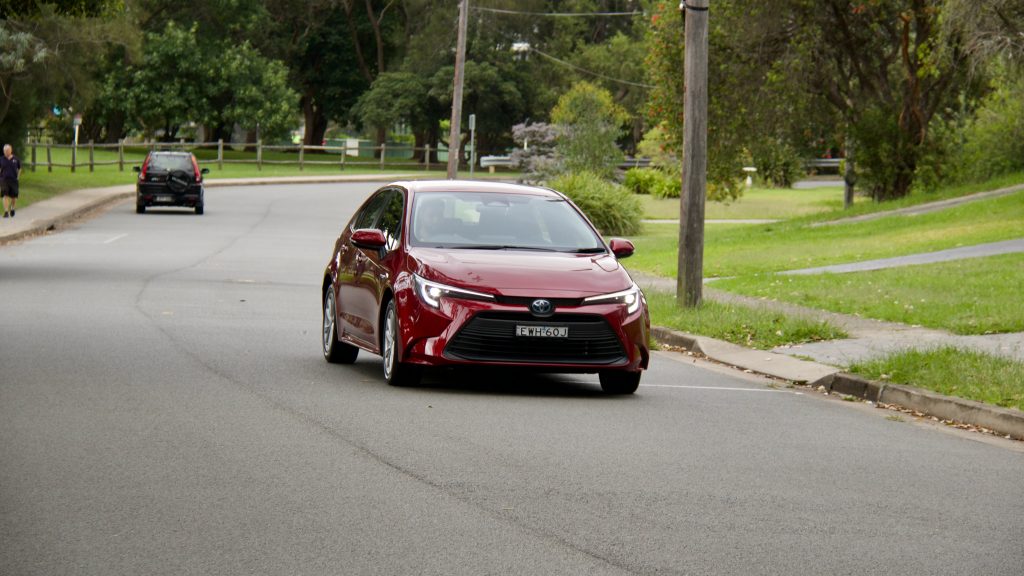
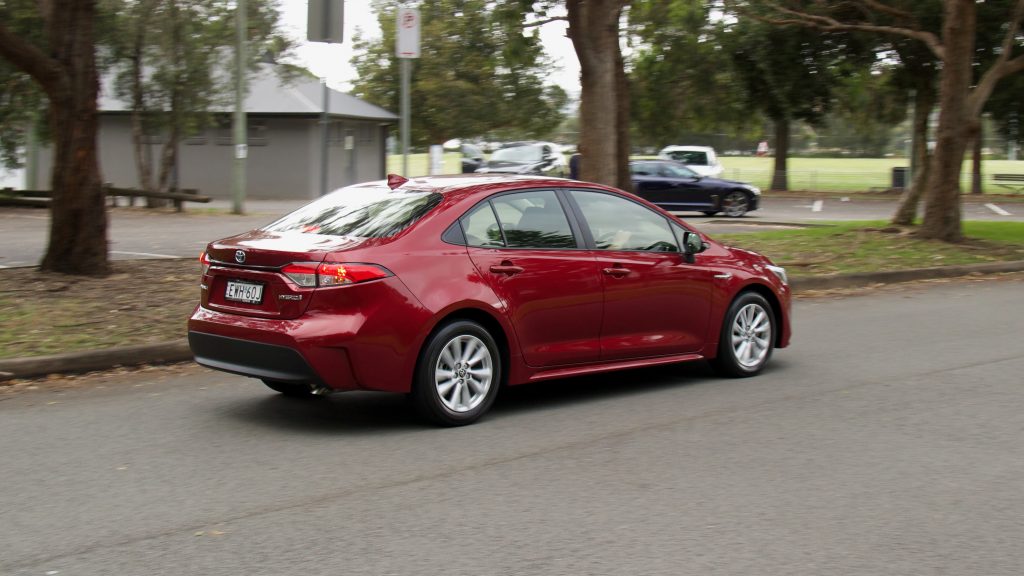
Despite all its positive attributes, it’s not perfect. The price will certainly raise a few eyebrows – there simply isn’t enough equipment to justify the price when compared to better equipped rivals, and Toyota is depending on the Hybrid drivetrain and its monopoly on the small hybrid sedan market to make up for the lack of equipment. The interior is also a bit low rent for the price, and competitors from Hyundai and Mazda outclass it in terms of design and quality.
For buyers who can look past the value equation and the interior, the basic hybrid Corolla sedan is a great all-rounder and well worth putting on your comparison list if you’re on the hunt for a new small sedan. It retains plenty of what made the Corolla a household name, with the added benefits of the hybrid drivetrain and fun handling.
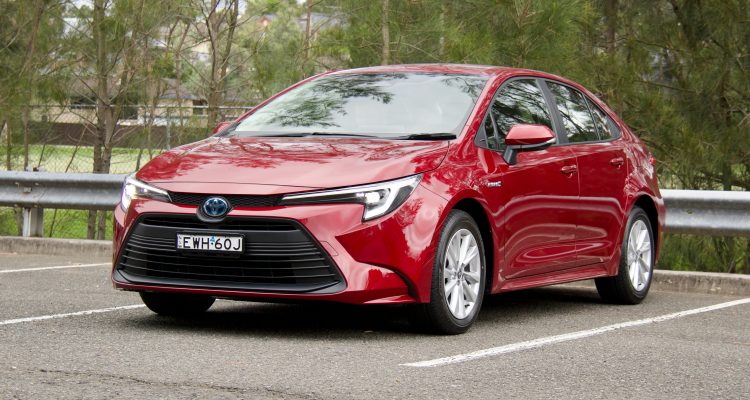
Leave a Reply